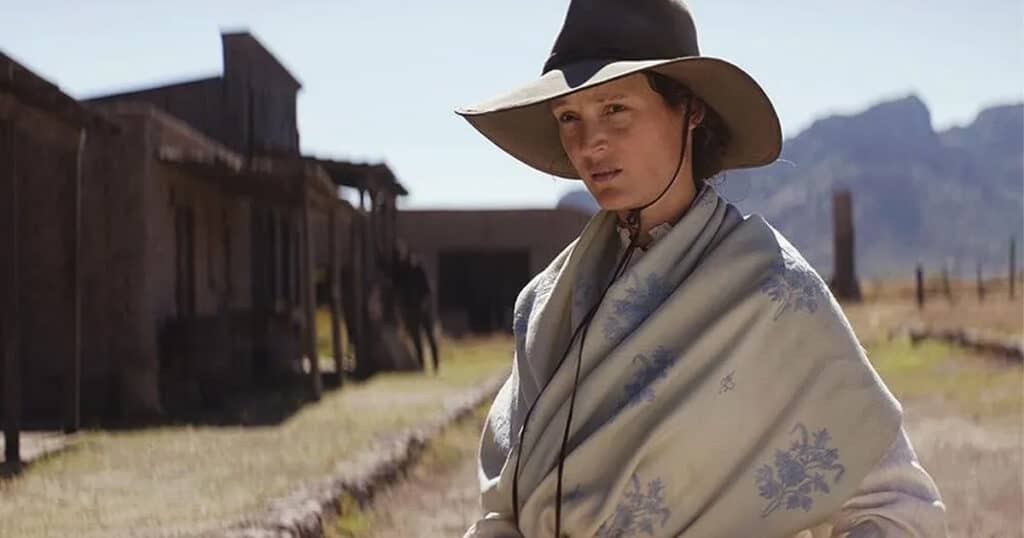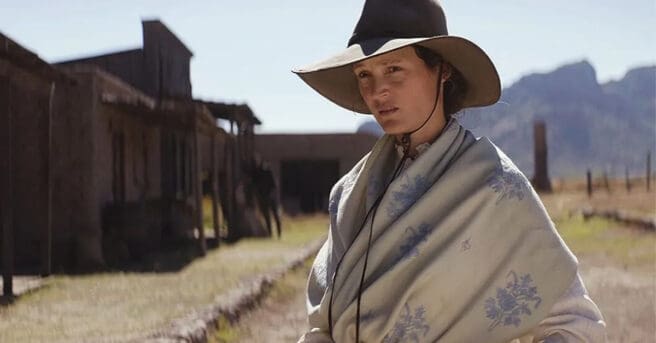Viggo Mortensen’s revisionist western, The Dead Don’t Hurt, is a fine entry into the genre with two great lead performances.

PLOT: In the Old West, a Danish carpenter (Viggo Mortensen) falls in love with a French Canadian flower seller (Vicky Krieps). They resettle in a Nevada town, but when he goes off to fight in the Civil War, she must find a way to exist in their corrupt and violent environment, with the town lorded over by a land baron (Garret Dillahunt), his psychotic son (Solly McLeod) and a weasely mayor (Danny Huston).
REVIEW: Just when you thought you’d seen every variation on the Western comes Viggo Mortensen’s The Dead Don’t Hurt, which marks his second film as a director following the Sundance hit Falling. Mortensen, who also produced, wrote, and composed the music, co-stars with Vicky Krieps in what could best be called a deconstructed western. The premise is pretty old school in that Mortensen is a sheriff seeking to avenge the brutal rape of his lover at the hands of a rich man’s son. It’s been done in plenty of movies, but never in the style they use here.
Mortensen, while not shying away from the genre elements of the movie, is more interested in the emotional fallout of the rape than anything else. He reframes the story around Vicky Krieps’ Vivienne. The film daringly opens with her death after a sudden illness, with Mortensen’s Olsen turning in his badge, grabbing his son, and taking off after Solly McLeod’s Weston Jeffries, who we’ve seen brutally murder half a dozen men, only for his wealthy father, Alfred (Garret Dillahunt) to have one of his lackeys take the fall. For Olsen, this miscarriage of justice, coupled with the recent death of his wife, leads him to take off after Weston, and while this could have made for a straight-forward western, what Mortensen does next is unusual. While his own character, Olsen, seemed to be the lead, suddenly, the perspective switches to Krieps’ Vivienne, with us watching as she falls in love with Olsen and winds up living with him in Nevada.
Mortensen vanishes from the film’s second act, as Vivienne has to learn to navigate the town she’s essentially been abandoned in, as he’s impulsively joined the Union cause in the Civil War. Alone in a town she doesn’t know, she goes to work in a saloon but becomes an object of lust for McLeod’s Weston, with his dad indulging the boy’s sadistic streak, such as when he beats the saloon’s Mexican piano player half to death.
We know from the start that Weston will rape Vivienne, and Mortensen doesn’t show the act itself, as he seems much more interested in the emotional fallout. Vivienne is forced to go on with her life in town, and winds up pregnant, and the movie focuses on not only her coming to terms with her new life but also Olsen’s when he arrives home after the war and is unable to avenge his wife. It’s much more of a story of healing, with the movie’s best parts showing both the two’s initial courtship and the rekindling of their love that happens later.

Krieps is superb as the headstrong Vivienne, who, as she tells Olsen, only ever wanted tenderness in a world that’s short of it. It’s a love story, above all things, which was a surprise as after reading the description and the fact that it was being called a feminist Western, I expected it to be about her going for revenge, but that’s not how this movie works. Mortensen subverts audience expectations constantly, even in his character’s pursuit of Weston, which we keep cutting back to. While it’s her film, Mortensen also plays perfectly to form as the strong, macho, but also tender and loving Olsen. Most importantly, we buy the love between the two and want them to live happily ever after, even if we know from the start that will not happen.
My only issue with The Dead Don’t Hurt is that Mortensen’s bad guys are a pretty standard collection, with Dillahunt, McLeod, and Danny Huston all playing the kinds of roles that have existed since John Ford started shooting two-reelers in Monument Valley. They’re playing archetypes, but that’s deliberate as Mortensen clearly still wants the movie to function as a good example of the genre, and all three men, while typecast (in the case of Dillahunt and Huston), are perfect.
Overall, I really enjoyed The Dead Don’t Hurt on many levels. It works as a solid Western and modern deconstruction of the genre. The performances are terrific, and the story comes to a haunting, unexpected end that will stick with you long after the credits roll.


